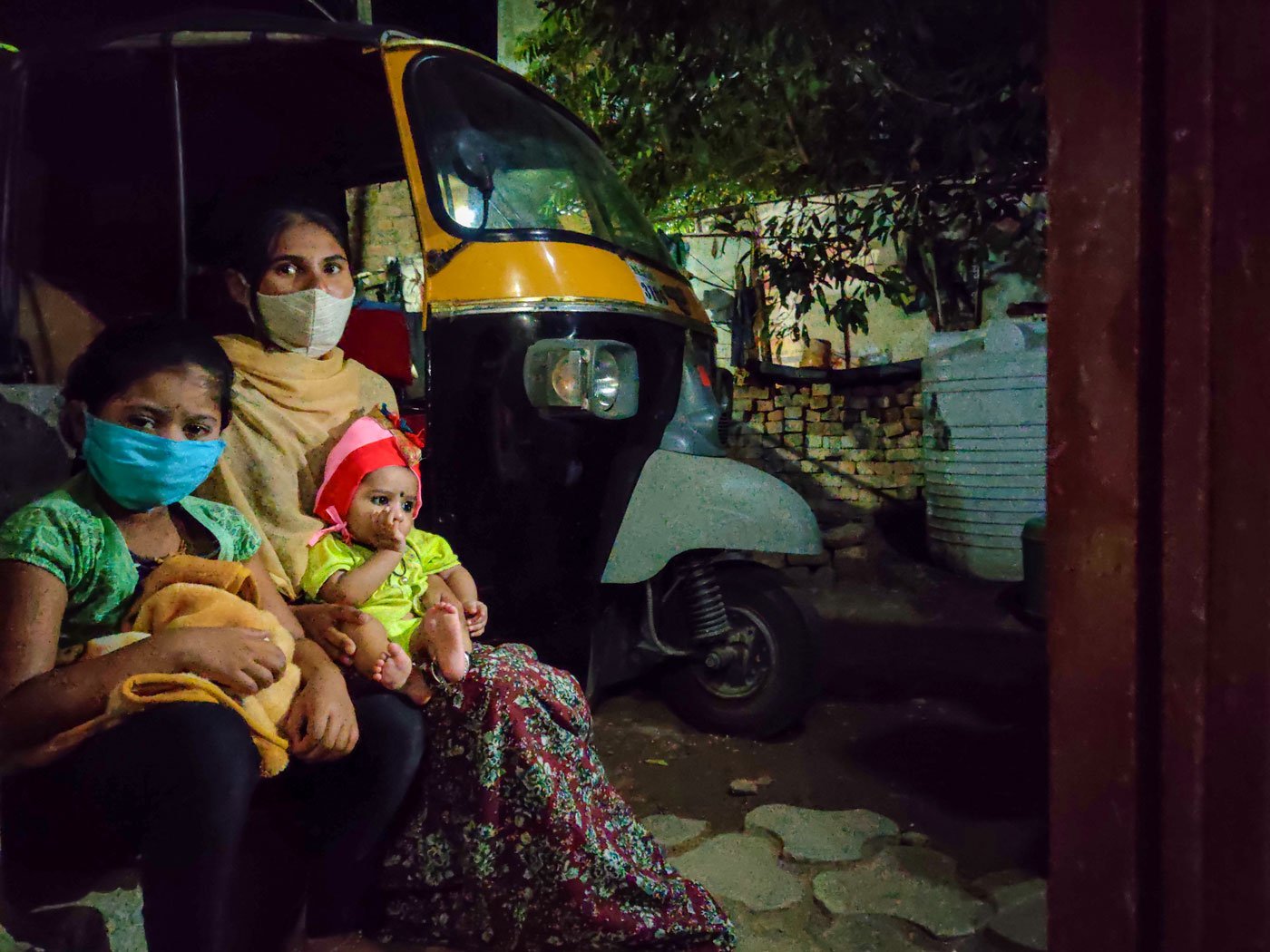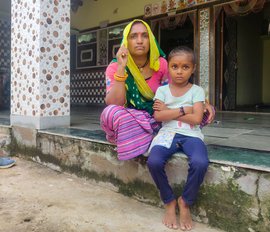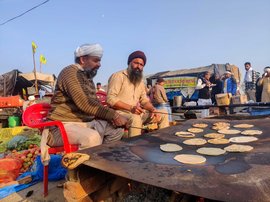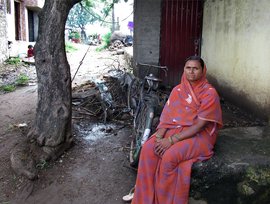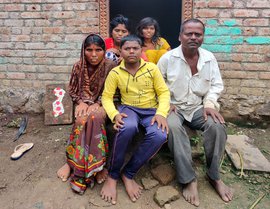Eight days after testing positive for Covid-19, Ramling Sanap died in the hospital where he was being treated for the infection. But it wasn’t the virus that killed him.
A few hours before he died, Ramling, 40, had phoned his wife, Rajubai, from the hospital. “He was in tears when he found out how much his treatment was costing,” says his nephew, 23-year-old Ravi Morale. “He thought he’d have to sell his two-acre farmland to pay the hospital bill.”
Deep Hospital in Maharashtra's Beed city, where Ramling was admitted since May 13, had charged Rs. 1.6 lakh for his treatment, says Pramod Morale, Rajubai's brother. “We somehow paid it in two instalments, but the hospital was asking for another 2 lakh rupees,” he says. “They told the patient instead of his family. What was the need to burden him?”
The thought of the hospital bill, nearly double the family's annual income, was overwhelming to Ramling. In the wee hours of May 21, he walked out of the Covid ward and hanged himself in the hospital corridor.
Rajubai, 35, had tried to pacify her distressed husband when he called on the night of May 20. She told him they could sell their motorcycle or borrow money from the sugar factory in western Maharashtra where they both worked. His recovery was all that mattered to her, she said. But Ramling was perhaps unsure of recovering the money.
Every year, Ramling and Rajubai used to migrate from their hamlet in Beed district's Kaij taluka to work in the sugarcane fields of western Maharashtra. They earned about Rs. 60,000 together for 180 days of arduous labour from November to April. In their absence, their three children – of ages 8 to 16 years – would be left in the care of Ramling’s widowed father.
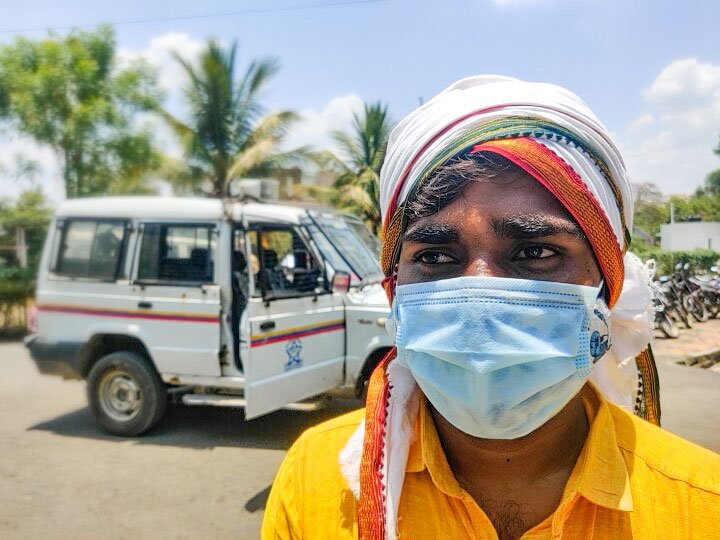
Ravi Morale says they took his uncle Ramling Sanap to a private hospital in Beed because there were no beds in the Civil Hospital
Once back in their hamlet, Tandalachiwadi, 50 kilometres from Beed city, Ramling and Rajubai cultivated
jowar
,
bajra
and soyabean on their land. Ramling also earned Rs. 300 a day for about three days a week, driving tractors in the bigger farms .
For a family struggling to make ends meet, their first choice was to go to the Civil Hospital in Beed when Ramling became ill. “But there were no beds there,” says Ravi. “So we had to take him to a private hospital.”
The rapid spread of the coronavirus in the second wave has highlighted the poor public healthcare infrastructure in rural India. In Beed, for example, only two major government hospitals serve the district's population of 26 lakhs.
Since public hospitals have been overflowing with Covid patients, people have had to turn to private hospitals even though they can't afford them.
For many, a one-time emergency has turned into a long-term debt.
A report published in March 2021 by the US-based Pew Research Center notes, "The number of people who are poor in India (with incomes of $2 or less a day) is estimated to have increased by 75 million because of the Covid-19 recession." This, and the shrinking of the middle class in India by an estimated 32 million in 2020, accounts for 60 per cent of the global increase in poverty, the report says.
The pandemic's impact is particularly visible in Beed and Osmanabad – neighbouring districts in Maharashtra’s Marathwada region – already grappling with climate change, water scarcity and agrarian distress, and now Covid too. As of June 20, 2021, Beed recorded over 91,600 Covid cases and 2,450 deaths, and Osmanabad saw about 61,000 cases and more than 1,500 deaths.
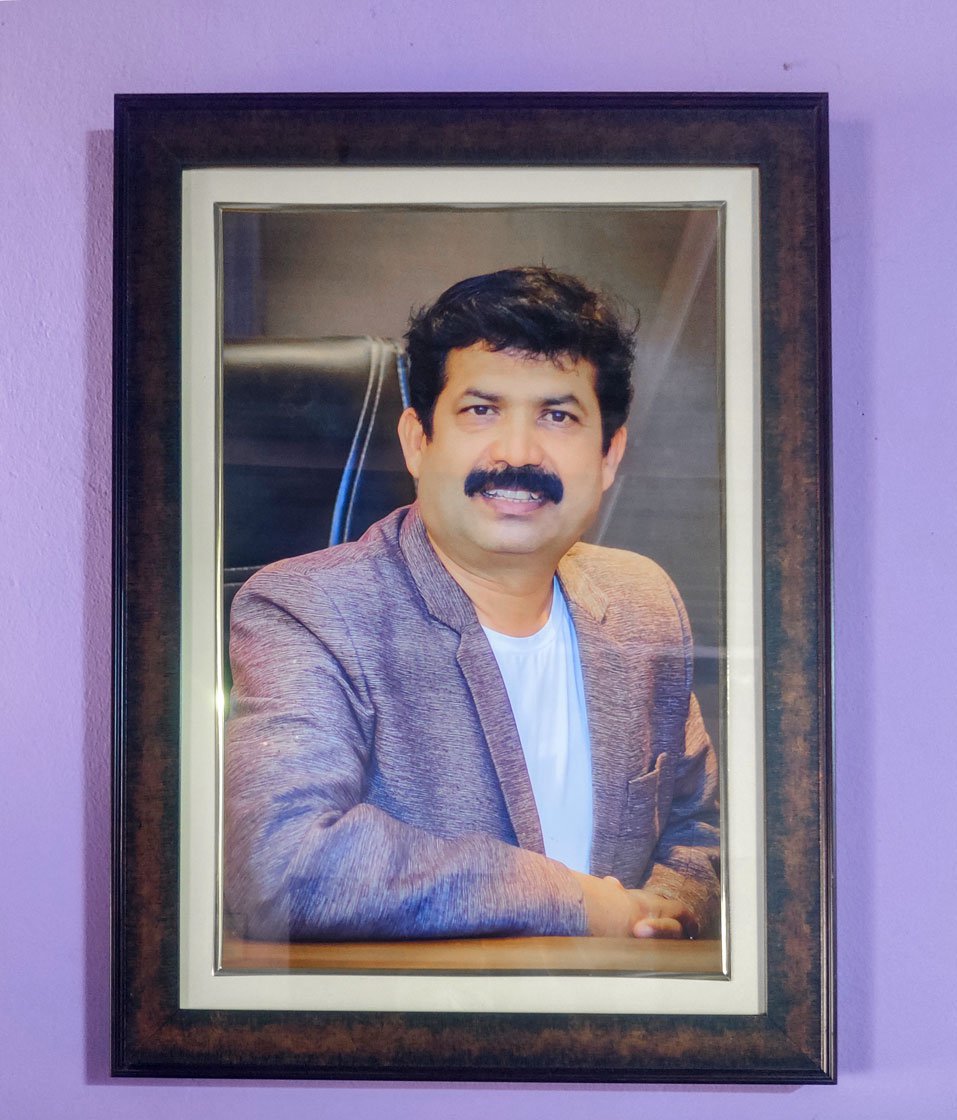
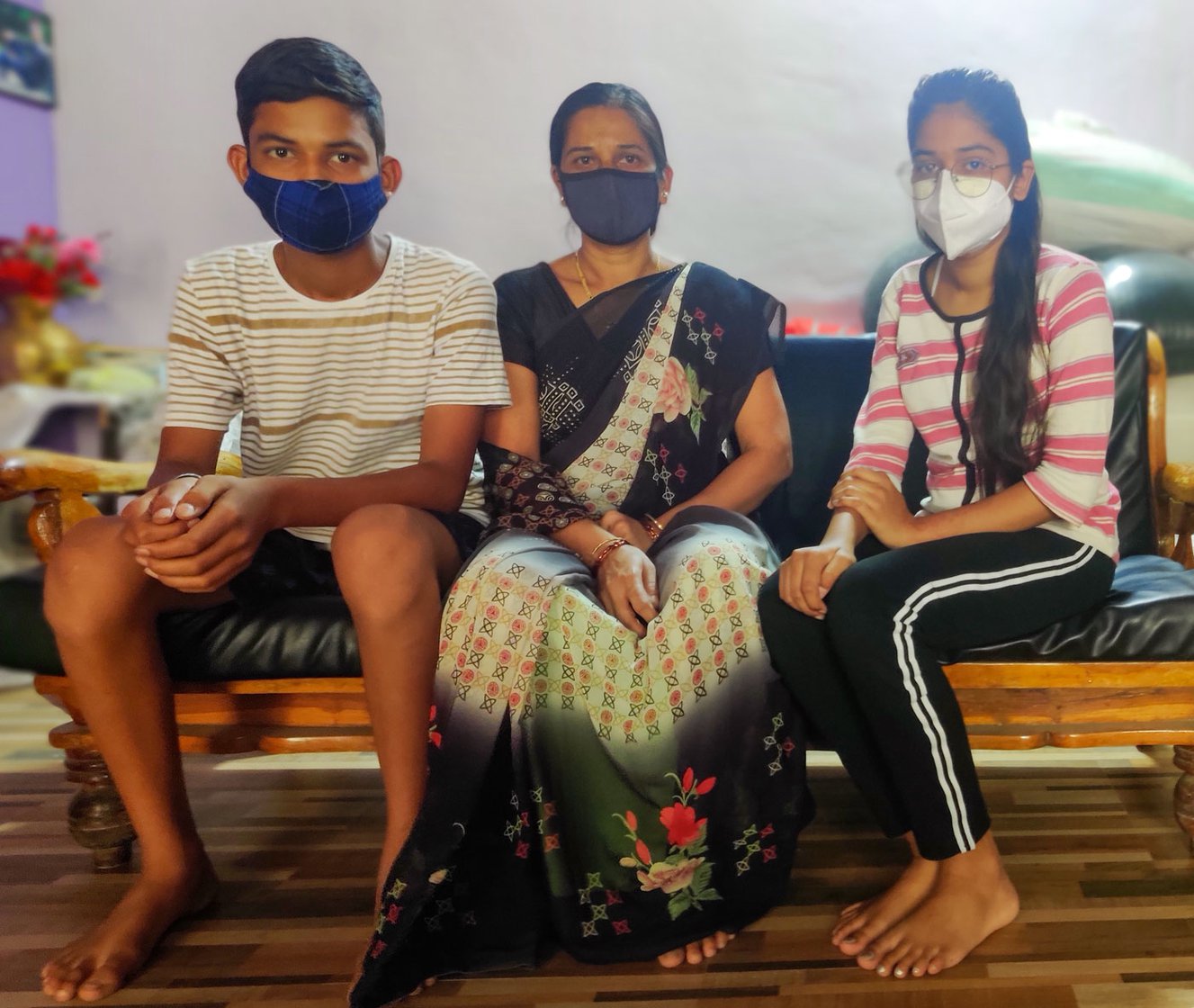
Left: A framed photo of Vinod Gangawane. Right: Suvarna Gangawane (centre) with her children, Kalyani (right) and Samvidhan
On paper, though, the poor are well looked-after.
The government of Maharashtra has capped private hospital charges to ensure that Covid patients don’t lose all their savings. The hospitals aren't allowed to charge more than Rs. 4,000 per day for a general ward bed, Rs. 7,500 for a bed in the intensive care unit (ICU) and Rs. 9,000 for an ICU bed with ventilator.
The state’s flagship health insurance scheme – Mahatma Jyotirao Phule Jan Arogya Yojana (MJPJAY) – covers medical expenses (up to Rs. 2.5 lakhs). Those eligible include families with an annual income of less than Rs. 1 lakh and farm households in 14 agriculturally distressed districts such as Beed and Osmanabad. MJPJAY's network of 447 empanelled hospitals, public and private, provides cashless treatment for illnesses and surgical procedures identified under the scheme.
But in April, Chirayu Hospital in Osmanabad refused to treat 48-year-old Vinod Gangawane under MJPJAY. “It was the first week of April and cases in Osmanabad were high. It was difficult to find a bed anywhere,” says his brother Suresh Gangawane, 50, who took Vinod to the private hospital. “A doctor at Chirayu Hospital said, ‘We don’t have the scheme, so tell me if you want a bed or not’. At that time, we were in a panic so we told them to start the treatment.”
When Suresh, who works in the health department of Osmanabad
zilla parishad
, made independent inquiries, he found out that the hospital was empanelled by MJPJAY. “I took it up with the hospital, but they asked me if I wanted the scheme or my brother,” he says. “They also said that his treatment would be stopped if we didn’t pay our bills regularly.”
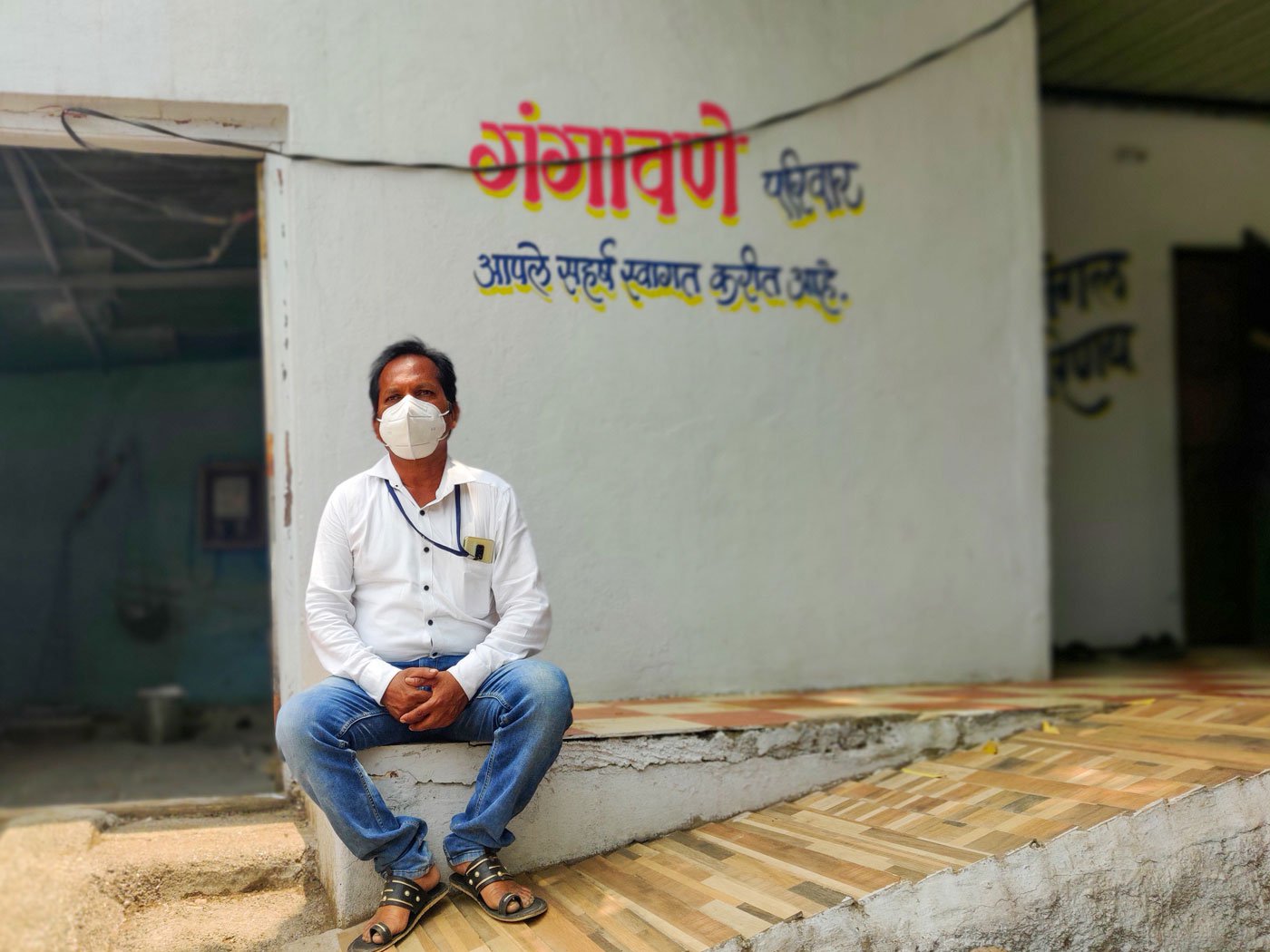
Suresh Gangawane fought against the hospital's exorbitant charges when his brother was refused treatment under MJPJAY
The Gangawane family, who own four acres of farmland on the outskirts of Osmanabad city, paid Rs. 3.5 lakhs for medicines, lab tests and the hospital bed for the 20 days that Vinod was there. When he died on April 26, the hospital demanded Rs 2 lakhs more, says Suresh, who refused to pay that amount. There was an altercation between him and the hospital officials. “I said I wouldn’t take the body,” he says. Vinod’s body lay in the hospital for a whole day until the hospital dropped its demand for more money.
Chirayu Hospital's owner Dr. Virendra Gawli says that Vinod was not admitted under the health insurance scheme because Suresh didn't submit his Aadhaar card. That isn’t true, counters Suresh: "The hospital didn't entertain any queries about MJPJAY.”
The facilities at Chirayu are basic, says Dr. Gawli. “But when cases started rising, the [district] administration requested us to admit Covid patients. I was verbally told to look after them, and that if it got difficult, to refer them to another hospital,” he says.
So when Vinod developed breathing complications after 12-15 days of hospitalisation, Dr. Gawli says he advised the family to shift him to another hospital. “They refused. We did what we could to save him. But he had a heart attack on April 25 and died the next day.”
Shifting Vinod to another hospital would have meant finding another oxygen bed in Osmanabad, says Suresh. The family was already facing a traumatic week. Vinod and Suresh’s 75-year-old father, Vitthal Gangawane, had died of Covid-19 just a few days before. But the family didn’t tell Vinod. “He was already scared,” says 40-year-old Suvarna, Vinod’s wife. “He would get anxious whenever a patient died in his ward.”
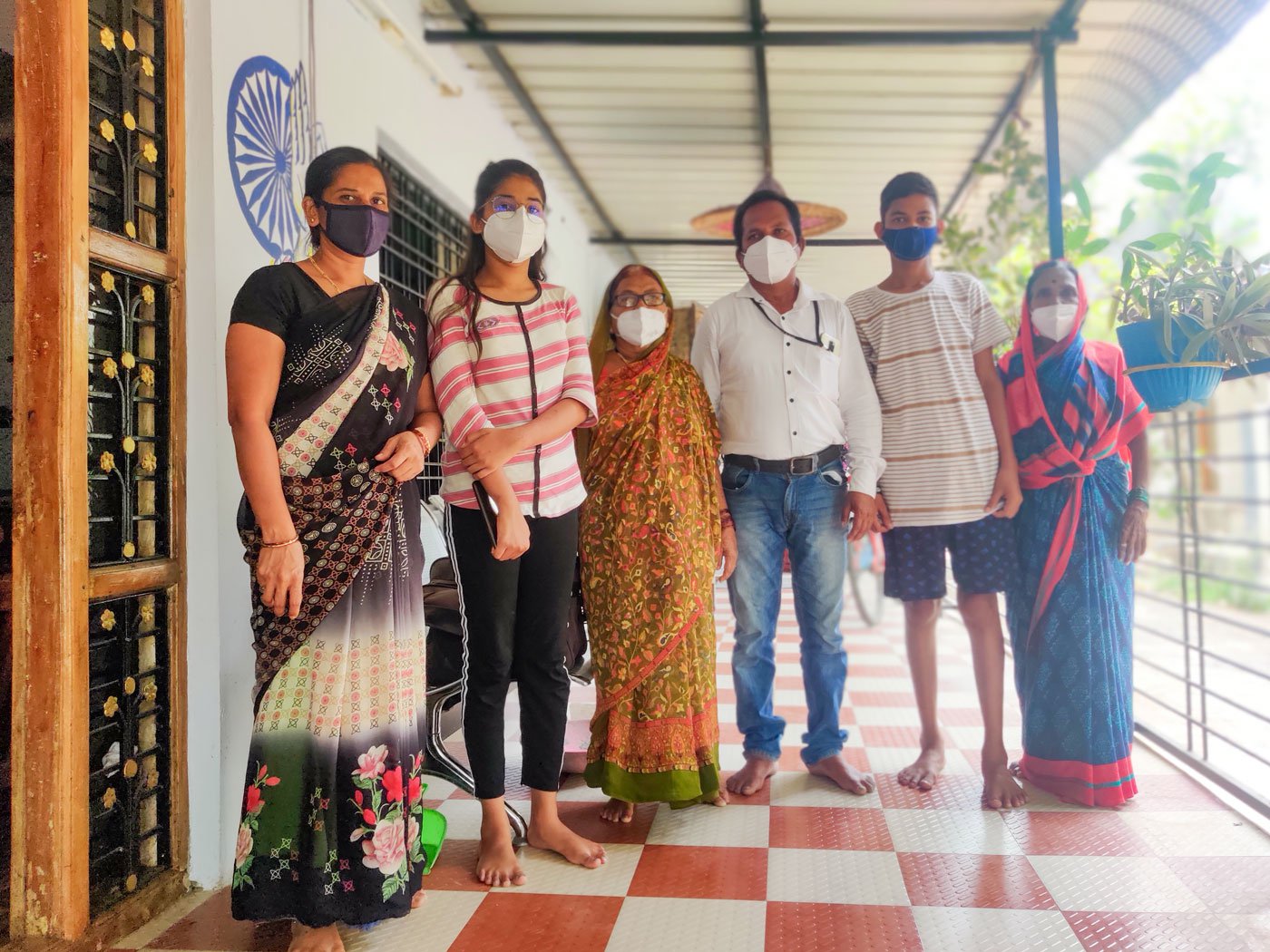
The Gangawane family at home in Osmanabad. From the left: Suvarna, Kalyani, Lilawati, Suresh, Samvidhan and a family friend
Vinod kept asking to see his father, says his daughter 15-year-old daughter, Kalyani. "But we made up an excuse each time. Two days before he died, we took my grandmother [Vinod’s mother, Lilawati] to the hospital so he could see her.”
For the visit, Lilawati even put on a bindi on her forehead – considered a taboo for a Hindu widow. “We didn’t want him to suspect anything,” she says, devastated at having lost her husband and son in the span of a few days.
The family will have to struggle to recover from the financial drain, says Suvarna, a homemaker. “I pawned my jewellery and we exhausted the family’s savings to pay the hospital.” Kalyani wants to become a doctor, she adds. “How do I fulfil her dreams? If the hospital had given us the benefit of the scheme, my daughter’s future would not have been threatened.”
In Osmanabad's private hospitals, only 82 Covid-19 patients were treated under MJPJAY between April 1 and May 12, says Vijay Bhutekar, the scheme's district coordinator. The coordinator in Beed district, Ashok Gaikwad, says that 179 patients availed of the scheme in the private hospitals there from April 17 to May 27. These figures are a fraction of the total number of hospital admissions.
Public healthcare must be improved and strengthened so that people don’t have to go to private hospitals, says Aniket Lohiya, secretary of Manavlok, a rural development organisation in Beed’s Ambejogai town. “Our primary health centres and village sub-centres are grossly short-staffed, so people don’t get decent health services,” he adds.
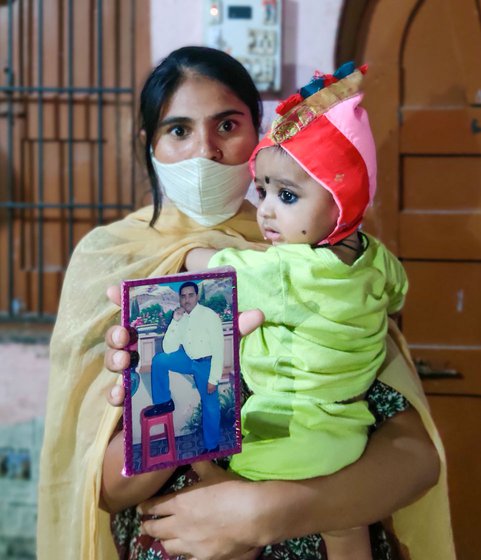
Ragini Phadke and Mukundraj
Since the outbreak of Covid-19 in March 2020, the MJPJAY office in Mumbai has received 813 complaints from across Maharashtra – most of them against private hospitals. So far, 186 complaints have been resolved and the hospitals have returned a total of Rs. 15 lakhs to the patients
“Even the major public hospitals are short-staffed and the doctors and nurses can’t give patients the attention they deserve,” Lohiya says. “In many cases, people go to private hospitals even when they can’t afford to because government hospitals don't create confidence”
That was why, in May, when Vitthal Phadke felt ill with Covid symptoms, he didn’t bother to look for a bed in the nearest government hospital. His brother Lakshman had died there just two days before, having suffered from Covid pneumonia.
Lakshman started feeling the symptoms in the last week of April 2021. When his health began to rapidly deteriorate, Vitthal took him to the Swami Ramanand Teerth Rural Government Medical College in Ambejogai (SRTRMCA), 25 kilometres away from Parli, their hometown. Lakshman was in the hospital for only two days.
Scarred by his brother's death at the government hospital, Vitthal went to a private hospital when he began to feel shortness of breath. “That hospital [SRTRMCA] is running around for oxygen every day. The doctors and staff don’t pay attention unless you shout many times. They are looking after too many patients at the same time,” says Ragini, Lakshman’s 28-year-old wife. “People are scared of this virus and they need attention. They need doctors to reassure them. So Vitthal didn’t think about money [for treatment at a private hospital].”
Vitthal recovered and was discharged within a week, but the relief didn’t last.
The hospital charged him Rs. 41,000. On top of that he had spent Rs. 56,000 on medicines – equivalent to what he or Lakshman would earn in about 280 days. He pleaded with the hospital for a discount, to no avail. “We borrowed money to pay the bill,” says Ragini.
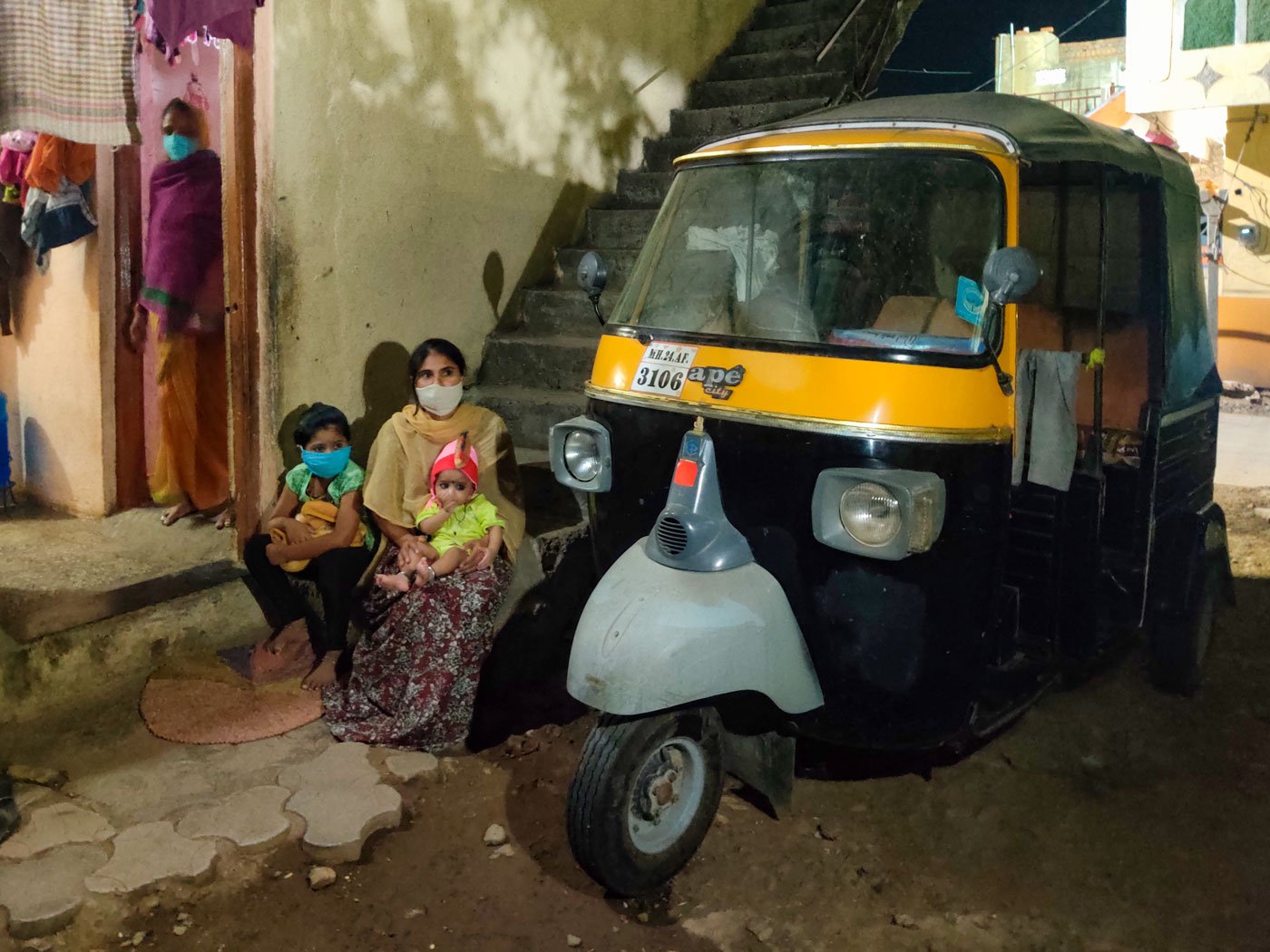
Ragini Phadke with her children outside their one-room home in Parli. The autorickshaw is the family's only source of income
Vitthal and Lakshman earned a living by driving an autorickshaw in Parli. “Lakshman drove it during the day, and Vitthal at night,” says Ragini. “They usually made Rs. 300-350 a day each. But they barely earned anything since the lockdown in March 2020. Hardly anyone hired autorickshaws. Only we know how we have survived.”
Ragini is a homemaker and has an MA degree but she isn't sure how she’ll bring up her two children – seven-year-old Kartiki and Mukundraj, an infant. “I am scared to bring them up without Lakshman. We have no money. I even had to borrow for his funeral.”
The brothers’ autorickshaw – parked under a tree next to the family’s one-room house – where they live together with their parents – is the family's only means of earning money to repay their loans. But freedom from debt may be a long way off – the economy is in a tailspin and the family is one driver short to manoeuvre the narrow lanes of Parli.
Meanwhile, Osmanabad’s district magistrate, Kaustubh Diwegaonkar, is addressing the issue of overcharging by private hospitals. A notice he sent on May 9 to Sahyaadrie Multispecialty Hospital in Osmanabad city pointed out that only 19 Covid patients had been treated under MJPJAY from April 1 to May 6 even though the hospital had admitted 486 patients in that period.
Refusing to comment on the matter, Sahyaadrie Hospital's director Dr. Diggaj Dapke-Deshmukh told me that his legal team has taken cognisance of the magistrate's notice.
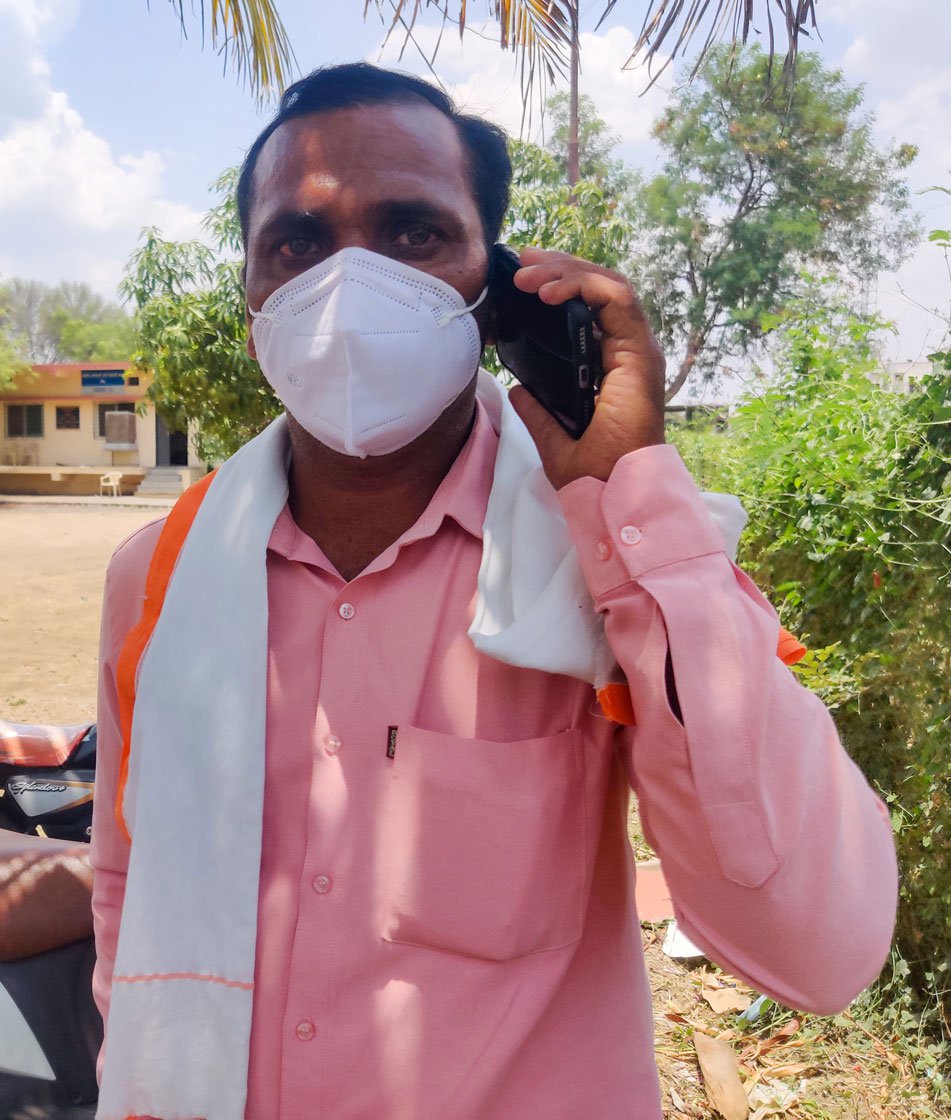
Pramod Morale
In December 2020, Diwegaonkar had written to the State Health Assurance Society, which implements the MJPJAY, asking it to cancel the empanelment of Shendge Hospital and Research Centre. His letter included a list of patients' complaints against the hospital, which is in Umarga, about 100 kilometres from Osmanabad city.
Among the grievances against Shendge Hospital was the use of a bogus arterial blood gas test for several patients. The hospital was also alleged to have fraudulently billed a patient for a ventilator bed.
As a result of the magistrate's action, the hospital is no longer a part of the MJPJAY network. However, its owner Dr. R.D. Shendge says that he opted out during the second wave because of his age. “I have diabetes too,” he adds, denying knowledge of complaints against his hospital.
Private hospital owners say that MJPJAY is not a financially viable scheme. “Every operational scheme needs to be updated with time. Nine years since it was introduced, the package costs have barely been updated after they were first laid out by the state government [in 2012],” says Dr. Sanjay Kadam, a Nanded-based plastic surgeon. He's a member of the Hospital Welfare Association, formed recently to represent the state's private hospitals. “If you consider inflation since 2012, the charges of MJPJAY packages are much lower – less than half of the normal charges,” he explains.
An empanelled hospital must reserve 25 per cent of its beds for patients receiving treatment under MJPJAY. “If the 25 per cent quota is full, the hospitals can’t admit a patient under the scheme,” Dr. Kadam adds.
MJPJAY's chief executive officer, Dr. Sudhakar Shinde, says, “Several cases of malpractice and irregularities by private hospitals have been found. We are looking into it.”
Since the outbreak of the coronavirus disease in March 2020, the MJPJAY office in Mumbai has received 813 complaints from across Maharashtra – most of them against private hospitals. So far, 186 complaints have been resolved and the hospitals have returned a total of Rs. 15 lakhs to the patients.
Typically thought, private hospitals that engage in malpractice and overcharging often have influential backing, observes Manavlok's Lohiya. “That makes it difficult for common people to take them on.”
But the morning that Ramling Sanap died by suicide, his furious family members wanted Deep Hospital to be held accountable. There was no doctor there when they reached that day. “The staff told us that the body had been sent to the police,” says Ravi.
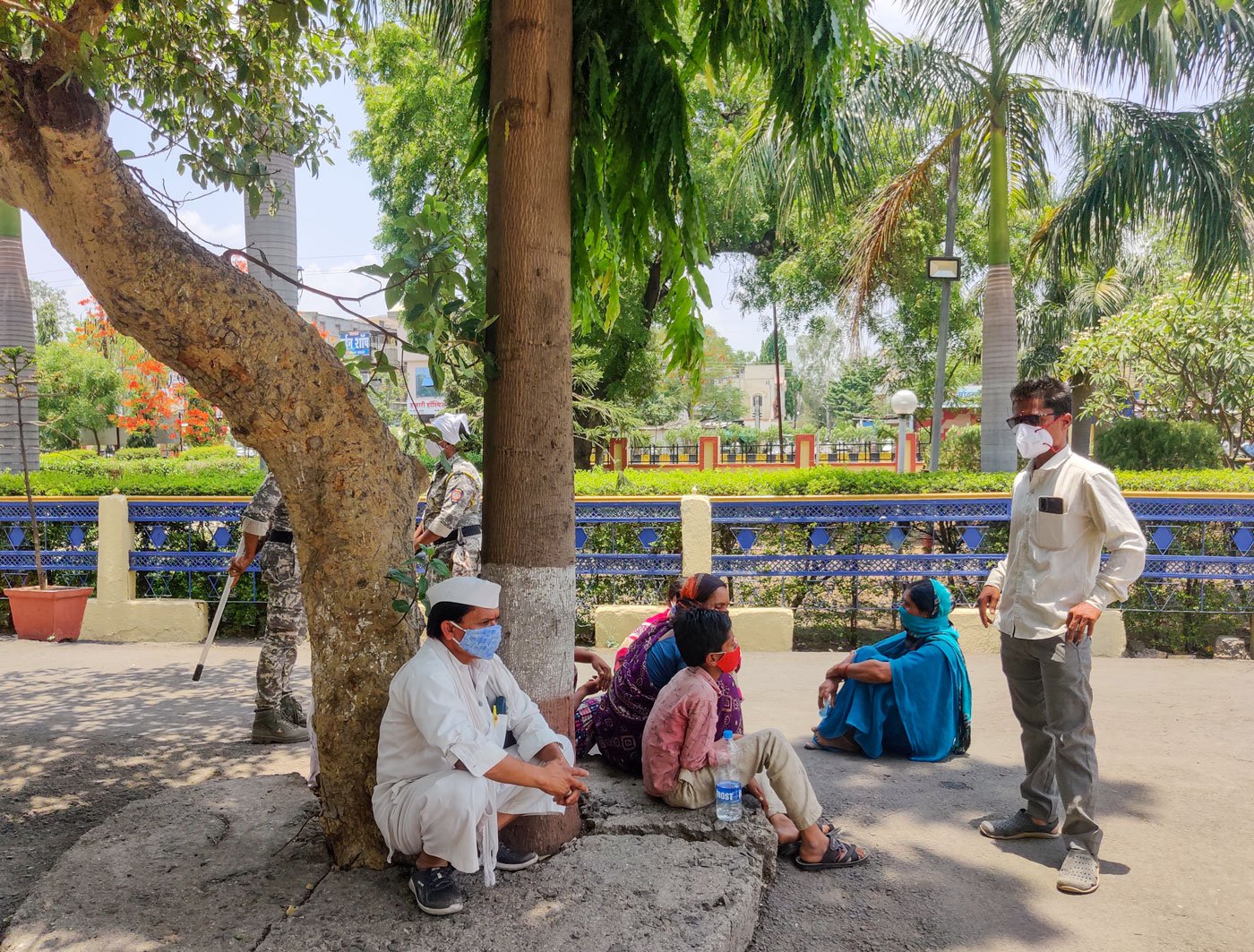
Ramling Sanap's extended family waiting outside the superintendent of police's office in Beed city on May 21
The family went straight to the superintendent of police and complained that the hospital had triggered Ramling’s death by asking him for money. His tragic demise was due to the hospital’s carelessness, they said, since no hospital staff was present in the ward at that time.
Deep Hospital, in a press statement, said that Ramling went to a spot where the ward assistants could not see him. "The accusation that the hospital repeatedly asked for money is untrue. The hospital had only taken Rs. 10,000 from the family. His suicide is tragic. We could not gauge his mental state,” the statement said.
Pramod Morale agrees that the hospital gave a bill of Rs. 10,000. "But they took Rs. 1.6 lakhs from us."
Ramling had been in good spirits, says Rajubai. “A day or two before he died, he told me on the phone that he had eaten eggs and mutton. He asked about the kids as well.” Then he heard about the charges. He conveyed his panic in his last phone call to her.
"The police said they would look into the matter but no action has been taken against the hospital so far," says Pramod. "It's as if the poor have no right to healthcare."
